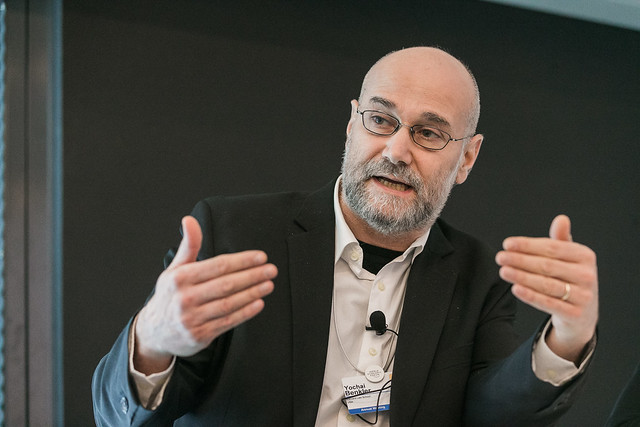Yochai Benkler is an law professor specializing in analyzing the role of the internet in information production. He is a board member of U.S. Programs at Open Society Foundations, a grantmaking organization created by left-of-center billionaire George Soros.
Career
On his website, Yochai Benkler lists his first job as a member and treasurer of the Kibbutz Shizafon in Israel from 1984-1987. In 1991, he graduated from Tel Aviv University with a bachelor of laws. Benkler then attended Harvard University Law School where he worked as a teaching fellow from 1992-1994 and graduated with his law degree in 1994. 1
After graduating, Benkler briefly became an associate at Ropes and Gary, a law firm based in Boston, MA. In 1995, Benkler was a clerk to U.S. Supreme Court Justice Stephen Breyer. In 1996, Benkler began working as an assistant professor of law at the New York University School of Law. In 1999, he became an associate professor. 2
In 2001, Benkler became a full professor at NYU and a visiting professor at Harvard Law School and Yale Law School. 3
In 2003, Benkler left NYU to become a full-time professor at Yale Law School. 4
In 2007, Benkler joined Harvard University as a professor of entrepreneurial legal studies and co-director of the Berkman Center for Internet and Society. 5
Benkler sits on the U.S. Programs board of the Open Society Foundations, as well as Fight-for-the-Future, an internet-freedom advocacy group, and the Freedombox Foundation, a private internet service provider. 6
Views
Internet Freedom, Impact, and Censorship
Yochai Benkler’s first prominent work was the 2006 Wealth of Networks, in which Benkler argued that the internet would enhance individual freedom and democratize the production of information and culture, largely to the benefit of society. However, he warned about the potential danger of major corporations asserting control over the internet and advocated for “net neutrality” as a safeguard. 7
After the 2016 election, Benkler’s views shifted to advocating for more efficient centralization and “gatekeeping” to diminish supposed misinformation propagated on a decentralized internet. 8
Polarization
Benkler disagrees with the common view that the recent political polarization of the American people can be significantly attributed to the rise of online media and social media. Rather, Benkler’s research after the 2016 election indicated that most Americans with what he considered to be extreme views had far more exposure to traditional media, particularly on television. Benkler especially attributes Fox News, Breitbart and other right-of-center outlets with pushing extremist views as a strategy to capture a fractured market. While Benkler acknowledges a left-wing bias in outlets like the New York Times, he asserted that they have more adherence to objectivity due to greater scrutiny from subscribers. 9
Wikileaks
In 2011, after Wikileaks released hundreds of thousands of confidential American diplomatic cables, Benkler defended Wikileaks, characterizing the group as a journalistic endeavor with First Amendment protection, stating, “You can’t distinguish Wikileaks from the New York Times along any dimension that is constitutionally relevant.” He accused the U.S. government of framing Wikileaks as a “terrorist organization.” 10
Political Donations
In 2018, Yochai Benkler donated $5,400 to U.S. Senator Elizabeth Warren (D-MA). He had previously donated $2,500 to her in 2011. 11
References
- “Yochai Benkler.” Yochai Benkler. Accessed April 8, 2022. https://www.benkler.org/CV.html.
- “Yochai Benkler.” Yochai Benkler. Accessed April 8, 2022. https://www.benkler.org/CV.html.
- “Yochai Benkler.” Yochai Benkler. Accessed April 8, 2022. https://www.benkler.org/CV.html.
- “Yochai Benkler.” Yochai Benkler. Accessed April 8, 2022. https://www.benkler.org/CV.html.
- “Yochai Benkler.” Yochai Benkler. Accessed April 8, 2022. https://www.benkler.org/CV.html.
- “Yochai Benkler.” Yochai Benkler. Accessed April 8, 2022. https://www.benkler.org/CV.html.
- Klein, Peter G. “The Independent Review Journal of Political Economy.” Independent Institute. Winter 2008/2009. Accessed April 8, 2022. https://www.independent.org/publications/tir/article.asp?id=721
- [1] Pasovsky, Uri. “The Fake News Debate is a Distraction, says Information Era Intellectual Yochai Benkler.” CTech. August 12, 2017. Accessed April 8, 2022. https://www.calcalistech.com/ctech/articles/0,7340,L-3726944,00.html.
- “Selling Outrage.” Boston Review. November 12, 2018. Accessed April 8, 2022. https://bostonreview.net/articles/yochai-benkler-deborah-chasman-selling-outrage/.
- “Benkler argues against prosecution of Wikileaks, detailing government and news media “overreaction.” Harvard Law Today. March 14, 2011. Accessed April 8, 2022. https://today.law.harvard.edu/benkler-argues-against-prosecution-of-wikileaks-detailing-government-and-news-media-overreaction-2/.
- “Donor Lookup: Yochai Benkler.” Open Secrets. Accessed April 8, 2022. https://www.opensecrets.org/donor-lookup/results?name=Yochai+Benkler.



